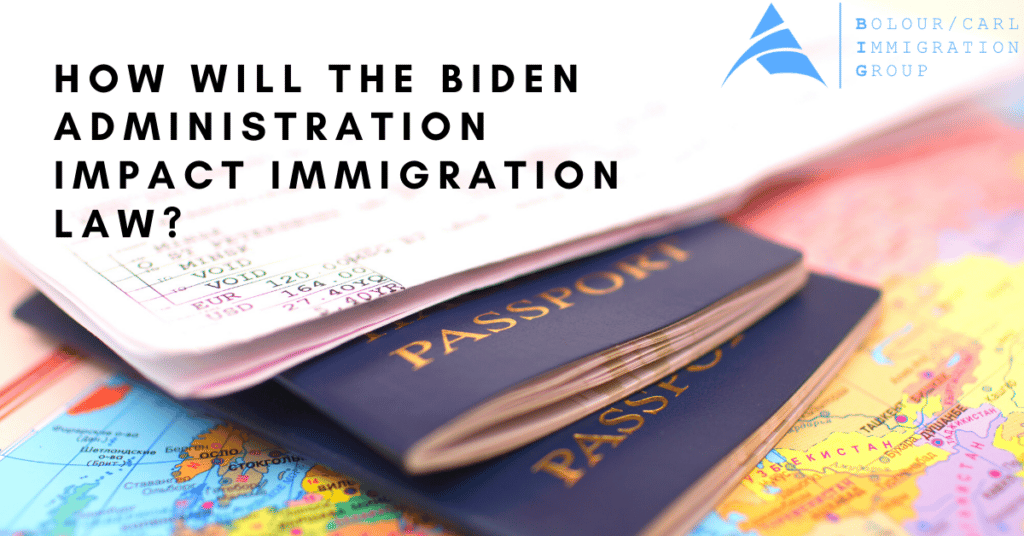
In his first days in office, President Joseph Biden has taken aggressive action to reform immigration and re-establish the United States as a beacon to newcomers. The new president signed several executive orders and sent a sweeping reform bill to Congress aimed at reversing many of the immigration policies of the previous administration and creating a path to citizenship for millions of undocumented immigrants. While the executive orders take effect immediately, it’s important to note that the bill is merely a work in progress that is expected to face contentious debate in Congress. Nonetheless, we are optimistic that the actions so far herald an era of favorable policies with greater stability and fewer roadblocks for the immigrant community.
Providing a pathway to citizenship
President Biden’s proposed U.S. Citizenship Act of 2021 would create an earned roadmap to citizenship for roughly 11 million undocumented individuals. The bill would allow undocumented individuals to apply for temporary legal status, with the ability to apply for green cards after five years if they pay their taxes and pass criminal and national security background checks. Under the legislation, Dreamers (undocumented immigrants who were brought to the U.S. as children), TPS (temporary protected status) holders, and immigrant farmworkers who meet specific requirements would be eligible for green cards immediately. After three years, all green card holders who pass additional background checks, and who demonstrate knowledge of the English language and U.S. civics, can apply to become citizens. Applicants must have been physically present in the U.S. on or before January 1, 2021. (Those who were deported on or after January 20, 2017, who were physically present for at least three years prior to removal for family unity or other humanitarian purposes may be eligible for a waiver of the presence requirement.)
Fortifying DACA
In addition to asking Congress to make Dreamers eligible for green cards, President Biden sent a memo to the Departments of Justice and Homeland Security ordering that they take all appropriate actions to safeguard DACA (Deferred Action for Childhood Arrivals). The Obama-era program provides protections and allows temporary work permits for the 640,000 undocumented immigrants brought to the U.S. as children as long as they obey the law and stay in school or enlist in the military. President Biden’s action follows efforts by the previous administration to end DACA in court. While most of these attempts were defeated, one challenge, in the U.S. District Court for the Southern District of Texas, is still pending.
Reversing the Muslim ban
On his first day in office, President Biden issued an executive order to reverse the Trump administration’s so-called “Muslim travel ban,” which restricted travel and immigration to the U.S. from several countries. Biden’s order reversed a 2017 executive order from the previous president, which impacted foreign nationals from seven predominantly Muslim countries, as well as subsequent orders that made amendments to the ban, removed some countries, and added new ones, many of which were in Africa. With his executive action, Biden ordered the State Department to instruct consulates and embassies to begin processing visa applications from the 13 countries currently on the list – Eritrea, Iran, Kyrgyzstan, Lybia, Myanmar, Nigeria, North Korea, Somalia, Sudan, Syria, Tanzania, Venezuela and Yemen – and to clear backlogs of cases in waiver processing. Further, the State Department has been charged with developing a plan to remedy the harms caused by the ban.
Reviewing the Public Charge Rule
The president plans to sign several additional immigration-related executive orders the week of February 1, including one directing an immediate review of the Public Charge Rule. The rule, which was originally passed in 1882 to allow the U.S. to deny admission to applicants who were unable to care for themselves without becoming ‘public charges,’” was revamped under the Trump administration to define a broader population of applicants as likely to become dependent on public assistance, based on factors such as age, health, family status, income, assets, education, skills and prior use of certain government benefits. Most applicants for green cards and other visas and extensions of nonimmigrant stays or adjustment of status are subject to review under the Public Charge Rule. Those applying for a green card from within the United State must now file Form I-944, a declaration of self-sufficiency, to be used by U.S. Citizenship and Immigration Services to determine if the individuals are likely to be able to support themselves and their families without relying on public benefits. A long-form that must be submitted with supporting documentation, Form I-944 has significantly complicated the green card application process. President Biden has said he would like to end the rule and revert back to the previous, less restrictive version, which will require a legislative process.
Bolour/Carl Immigration Group is a full-service immigration law firm. If you would like to speak to an immigration attorney about how the new administration’s policies will impact you, your family, your business, or your employees, contact us at 323-857-0034 or [email protected].




